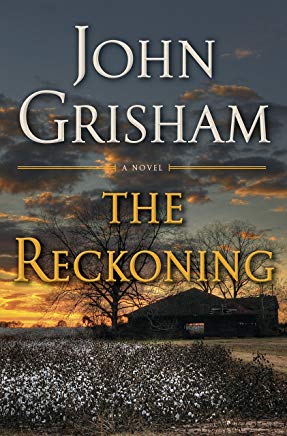
On our semi-annual road trip from Minnesota to Montana to ski Bridger Bowl, my wife and I listened to two new novels. She started listening to Grisham’s latest, The Reckoning, on Audible during her daily walks along our rural country road. But winter set in and she never finished the book. So, we plugged in and, as we drove, we listened to this story of Pete Banning, the quiet, unwilling anti-hero of this tale.
The beginning segment of this long read (or listen) is set in rural Mississippi, on a family cotton farm and in the small town of Clanton. Pete Banning and his sister each own a section of land willed to them by their mother. Before WW II, Pete farmed both sections with the siblings splitting whatever profits were obtained by his efforts, mostly involving cotton and the manpower of Black workers who live on and work the land. When WW II breaks out, Pete, a West Point grad who left the Army for the family farm, does his duty, enlists in his old cavalry unit, and is shipped off to the Phillipines to fight. The book opens with Pete, a devout Methodist, preparing to murder and then murdering, his pastor. After the deed is done, the protagonist doesn’t resist apprehension by the local sheriff and says “I have nothing to say.” Banning maintains his silence as to motive throughout the legal process. It becomes quickly apparent that the plot of the story is not “who done it” but “why”. Grisham does a fantastic job with this noir legal writing (the timeframe is post-war, 1947) making the investigation, trial, and execution of Pete Banning gritty, realistic, and believable. Because of what I thought of the other two sections of the book, I will rate the story in that light, giving this first section a solid 4 and 1/2 stars. The writing’s a departure from the author’s usual formula for which he deserves credit. And as he did in A Painted House, this noir portion of the novel includes serious, literary writing.
The second “book” within the novel is even better. It’s all backstory about Pete Banning’s service in the Phillipines. Turns out, Pete returned to Clanton, Mississippi after having been in combat, captured, tortured, escaped, and having fought for a ragtag guerilla force in the mountains of that Pacific battleground. Grisham is spot on here as a writer of historic fiction, a huge departure from his normal grist, and I’d rate the second section of the story, one that will bring chills to your spine and tears to your eyes, a solid 5. It includes some of this author’s best writing.
But. And I am saddened to say this. There is a ‘but”. So Banning is gone, leaving behind his portion of the farm, land that, before he killed the preacher, he tried to protect by putting in his children’s names. Much of the final section of the book, which deals with the aftermath of Pete Banning’s death and the reveal of the “why” behind the killing of the preacher is simply filler; word after word describing a legal process that, eventually, leads nowhere in terms of plot or interest. Grisham returns to the writing style and landscape (the civil courtroom) he knows best but, in the process, bores the ever-loving shit out of his readers (or listeners). But, and this is not the biggest but of the tale, it’s his reveal of Banning’s motivation for murder that ultimately fails as a plot device. Why? I guessed all of the details behind Pete Banning’s motivation for the deed after listening to the first section. There’s really no mystery here in terms of the killer’s reasons for wanting the preacher dead. The impeteus for the murder was, to me, no surprise. But, and this is the biggest but of the novel, that’s not the worst of it. At the last minute, out of the blue, Grisham tosses in a twist, a reveal, that has no predecessory basis other than one or two banal references earlier in the story. After likely over 100,000-plus words, we, the readers (or listeners) are expected to remember a tidbit of information provided dozens of chapters ago upon which we will agree to suspend our disbelief. No. Doesn’t work. And for all these reasons, I rate the final section of the story a paltry 2, far below even this author’s worst.
So what is this novel anyway? Is it crime noir? Is it a genre legal thriller? Is it a historical novel? Is it literary fiction? Up until the last segment of the book, I would have leaned towards saying that his is a literary work, with historical elements, and that it was likely John Grisham’s best. The first two sections solidify Grisham as a great storyteller. The final segment? It falls so flat and is so filled with such dullness and writerly chicanery, it leaves one angry that the author chose to return to form, and in the process, ruined a lovely, lovely tale.
I can’t rate the overall effort above 2 and 1/2 stars despite the majority of the book being a compelling read.
2 and 1/2 stars. A major disappointment.
Peace.
Mark


